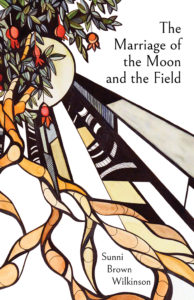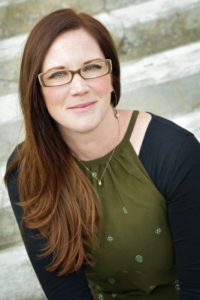 Sunni Brown Wilkinson introduces her debut poetry collection, The Marriage of the Moon and the Field, published by Black Lawrence Press, August 2019.
Sunni Brown Wilkinson introduces her debut poetry collection, The Marriage of the Moon and the Field, published by Black Lawrence Press, August 2019.
The genesis of this book feels in a large sense untraceable, since many of these poems contain pieces of narrative or emotions from my childhood or scenes that I’ve carried around with me for many years. But my interest in poetry itself is more traceable.
As a college student, I spent two summers working in West Yellowstone, Montana with my best friends, and I found that, though I packed novels to read all summer in the outlying meadows of lupine and Indian paintbrush, it was the poetry that stayed with me. Mary Oliver, William Stafford, Wallace Stevens, Eavan Boland all lit up something in me. On the long drives from West Yellowstone to Logan for weekend visits — usually alone and passing small towns with one gas station and a few tackle shops, fields, cattle, abandoned barns — I’d recite to myself the snippets of poetry I’d memorized. I think those are some of the best times of my life: just driving through that rugged beauty, being alone, and slowly teasing out lines, listening to the music of my voice, the hammering of my heart. Feeling larger and deeper than time.
At the end of my studies as an undergrad at Utah State University, as I was contemplating graduate school, I took a sharp turn and decided to pursue an MFA rather than an MA. I’d taken one poetry writing class but it felt electric, and I was writing a lot on my own anyway. I approached Ken Brewer, Utah’s poet laureate at the time and a friend of my mother, and he recommended some MFA programs. Really, my only stipulation was that it had to be a place where I knew I could live: in the West, within driving distance of home (I still loved those long drives through the country alone), and in a small city. Though I’d spent 18 months on a mission in New Jersey, I’d never taken to the East coast and had no desire to live in a sprawling city with any kind of skyline. Wherever I went, it needed to feel like home. I ended up at Eastern Washington University in Spokane.
Fast forward about ten years and I was still tinkering with some of the poems from my thesis, married, having babies, teaching at a university. I’d send out a manuscript occasionally to one or two contests but knew the book wasn’t ready. It wasn’t until I settled into the writing group that I have now that I really began to produce stronger work and at regular intervals. We met monthly (still do), just three of us in a corner of a café stewing for hours over a handful of poems, questioning every line, every comma.
That’s also the time I set up a rigorous schedule for myself. I woke up at about 5:30 every morning in an attempt to get down as much as I could before my kids got up. Somehow I managed it, and within about two years I had revised my manuscript to the degree that most of it held new poems, better poems. I sent the manuscript off to various contests for about 2 years (keeping track of deadlines and costs – eek!) and was finally accepted by an incredible publisher, Black Lawrence Press.
The book is a weaving together of what I love best, what I believe in most: place, people, and the mystery of God. The natural world has a wild heart but it is also, to me, God’s heart, since it’s his creation. And since people are also his creation, I find pieces of him there too. Refugees, a homeless man, a lady balloonist who crossed the Alps (who couldn’twrite about that?), the murdered women of Juarez, my children potty training or breathing at night, that one guy in our congregation who sometimes shows up a little drunk. I find all of them fascinating, beautiful subjects.
The title of my book is The Marriage of the Moon and the Field, and while it does have literal moons and fields in it, it’s meant to also reflect both our physical world (the field) and the ethereal (the moon) that is always with us, and their perfect, daily coming-together. My world is made up of mountains and rivers and wildflowers. Vibrant and startling people. And the Spirit, burrowed into the heart of the world.
Butter on the Bread and Honey on the Butter
There’s an engine in the garden
this morning, chugging from yarrow
to cosmos. That beggar of blossoms
carries a dagger, and all his sugar’s
the aftermath of spit. Later, the baby’s foot
finds him in the grass, and the wailing starts,
high and thin, until we bring
the cut onion to cool it
out of pain. It’s a trick: what makes you cry
under the knife
is also a balm. Like each child
I have borne. On the field trip
to the pioneer farm, kids crowd
the kitchen for a chance
to churn butter. The girl in the blue apron
wears her hair in two braids
and upbraids the kids like a mother
for not raising their hands. My son
has just milked a cow, slid
his hands over that strange balloon
that fills with milk slowly
from a place we can’t see. He is a room
with one bright window, he was the first
to make honey in my breast.
~~~
The baby roots
the moment he wakes, turning his face
to whatever moves him. Flanked
by his cries, I shift the T–shirt,
everything in the way of the breast
that opens itself like a flower.
~~~
There are days the bee comes sharply
and the sugar hardens
in the dark cupboard. Then I call myself
Honey, take me gently
by the hand. Like bread,
I’m practiced in the art
of rising. Like my son, I’m hungry
for what I don’t have.
Jesus called death the sting
and we understand. After he raised the dead,
what would they eat, the body
and the spirit fresh with empty?
The good bread of the house
and something on top. They ate their way
back to a consolable hunger,
like a baby, back to that rooting
that loosens the clutch. In the end
of the mouth it’s the tongue
searching, the tongue
that finds what’s sweet.
(originally published in Crab Orchard Review)
 Sunni Brown Wilkinson’s poetry has been published in Crab Orchard Review, Adirondack Review, BODY, Sugar House Review, Cimarron Review, Southern Indiana Review and other journals and anthologies and has been nominated for two Pushcarts. She holds an MFA from the Inland Northwest Center for Writers at Eastern Washington University and teaches at Weber State University. She lives in northern Utah with her husband and three young sons.
Sunni Brown Wilkinson’s poetry has been published in Crab Orchard Review, Adirondack Review, BODY, Sugar House Review, Cimarron Review, Southern Indiana Review and other journals and anthologies and has been nominated for two Pushcarts. She holds an MFA from the Inland Northwest Center for Writers at Eastern Washington University and teaches at Weber State University. She lives in northern Utah with her husband and three young sons.
